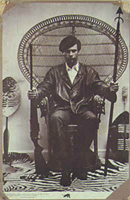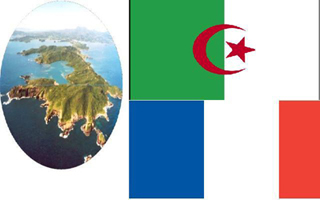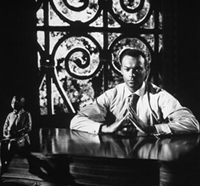Home >> Icons in the African Diaspora >> Frantz Fanon
Frantz Fanon
In 1952 Frantz Fanon began to practice in a psychiatric ward in Algeria. At Blida-Joinville’s hospital, where Fanon worked as the director of the psychiatric department, he applied the ideas of François Tosquelles, an innovative practitioner of group therapy and began finding parallels between the patients of the hospital and the colonized of the nation of Algiera. In 1954 the Algerian National Liberation Front, FLN, started its open warfare against French rule and after three years of research, Fanon resigned as director and allied himself with the Algerian liberation movement that sought to throw off French rule. Fanon hid terrorists at his home and trained nurses to dress wounds. He believed that violent revolution was the only means of ending colonial repression and cultural trauma in the Third World. “Violence is a cleansing force. It frees the native from his inferiority complex and from his despair and inaction; it makes him fearless and restores his self-respect,” Fanon argued in his revolutionary work The Wretched of the Earth. His research and alternative politics proves just as radical and relevant in a contemporary setting. This Caribbean born, France educated intellectual analyzed the impact of colonialism and its deforming effects, influencing not only his native land but African revolutions and leaders in the Black Power Movement in the United States and anti-colonial, and black consciousness movements around the world.
|
Much of the controversy surrounding Fanon was steeped in the idea that he believed the lower classes could be the driving force of any grassroots social movement: “[T]he unpreparedness of the educated classes, the lack of practical links between them and the mass of the people, their laziness, and, let it be said, their cowardice at the decisive moment of the struggle will give rise to tragic mishaps.”
— Frantz Fanon, The Wretched of the Earth |
Another advocate of the potential influence of the lumpenproletariat, Huey Newton, one of the co-founders for the Black Panther Party for Self Defense, read the works of Fanon and admitted to modeling much of his ideology concerning the use of violence after Fanon’s philosophy concerning Algeria. He justified such parallels by stating that African Americans in the United States could be understood as a colonial people, a nation within a nation. |
 |
Born in the once French colony of Martinique and best known for his impact in the African country of Algeria, Fanon’s ideals certainly impacted the African Diaspora.

|
|


